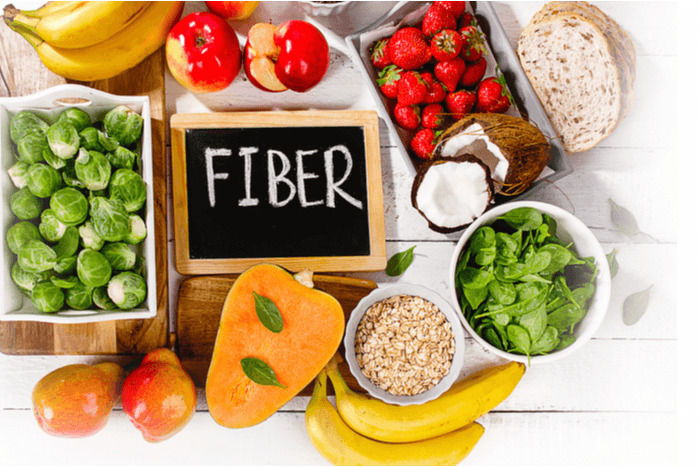Can You Take Fiber While Intermittent Fasting?
Written by Andrew Brewer. ⚕️Reviewed and fact checked by our medical team.
Fiber is such a powerful part of a balanced diet. Not only does it help you feel full longer, but it will also help treat constipation and diarrhea, lower cholesterol and glucose levels, improve heart health, and prevent diseases to enhance your lifespan. Fiber can be soluble, meaning it dissolves in water or insoluble, which helps move foods and materials through your digestive tract. Both are essential for your overall health and well-being, but can you take fiber while intermittent fasting?
If you plan on getting fiber from foods and vegetables, then no. You cannot eat fiber during fasting without breaking your fast. That’s a given during intermittent fasting. However, if you are planning on taking fiber supplements, then the answer is a little more complicated. It’s best to review the nutritional label to see if your fiber supplement contains calories, carbs, or sweeteners. If they do, it will break your fast. Let’s explore more about why that’s the case.
Key Takeaways
- Fiber is an important part of a balanced diet, and it offers numerous health benefits, including treating constipation and diarrhea, lowering cholesterol and glucose levels, improving heart health, and preventing diseases.
- If you plan on taking fiber supplements during intermittent fasting, it’s important to check the nutritional label to ensure that the supplement does not contain calories, carbs, or sweeteners, as these can break your fast and impact your fasting progress.
- Psyllium husk is typically safe to take during fasting, but it’s important to check the label to ensure that it does not contain any calories, carbs, or sweeteners.
- Starting slowly when taking fiber during fasting can help you avoid digestive issues and curb your cravings without breaking your fast.
Calories
Calories is one of the biggest no brainers when it comes to breaking your fast. If you’re eating or drinking something that contains calories – no matter how small – it will break your fast. Many people forget that supplements also can contain calories, so the same rules apply. If your fiber supplement has calories, it is technically breaking your fast.
Now, some intermittent fasting plans allow for flexibility. A cup of black coffee can contain 5 calories, and as long as you don’t add any sweeteners, you are good to go. The same rules can apply to fiber supplements if you let them, but it’s a personal choice. Ultimately, if it has calories, it will break your fast, but there is a grey area that lets you make the best choice for your lifestyle.
Carbs
Carbs are a big no-no when it comes to intermittent fasting. If the fiber supplement has carbohydrates, no matter how few, it will break your fast and cause an insulin spike. It will also likely break autophagy, which is the process intermittent fasting triggers to promote cellular healing and growth.
Take the supplement during your eating windows instead and either skip or look for a carb-free solution to take during your fasting windows. Typically, psyllium husk will be safe to take during fasting, but again, check the label. You don’t want any surprises when it comes to taking supplements while fasting. To ensure that you’re using only the most reliable and effective products, consider using only the best psyllium husk supplements.
Sweeteners
Sweeteners can be tricky. You know you need to avoid sugar during fasting, but what about no-calorie sweeteners? They don’t have any calories, so they’re not technically breaking fast, right? Unfortunately, that’s not the case. No-calorie sweeteners still need to be processed through your system, and as they’re broken down, they may cause an insulin spike, breaking your fast. Too, they will disturb your gut health. If your fiber supplement has any sweetner, it’s best to skip.
Why Should I Take Fiber During a Fast?
There’s many health benefits to taking fiber, and if you’ve found one that’s safe to take during fasting, that’s great! Fiber can also help you get through the fast, especially if you’re craving something sweet. Fiber can help balance your blood sugar, so add a little bit to your water.
Conclusion
During a fast, it’s best not take too much too quickly. Otherwise, it can cause digestive issues that will leave you feeling bloated and uncomfortable – or worse. Start slowly, adding a fraction of a serving and working your way up. This is a great way to curb your cravings without breaking your fast, but remember to double check the label. You don’t want to accidentally break your fast and slow down your intermittent fasting progress.
FAQ
Can taking fiber during intermittent fasting break my fast?
No, taking fiber while intermittent fasting does not break your fast, as fiber does not contain calories and does not stimulate insulin secretion.
How can fiber help during intermittent fasting?
Fiber can help during intermittent fasting by promoting satiety, regulating bowel movements, and improving digestion.
Can I consume fiber supplements while intermittent fasting?
Yes, you can consume fiber supplements while intermittent fasting, but it is generally recommended to get fiber from whole foods rather than supplements.
What are the best sources of fiber to consume during intermittent fasting?
The best sources of fiber to consume during intermittent fasting include fruits, vegetables, whole grains, nuts, seeds, and legumes.
How much fiber should I consume while intermittent fasting?
The recommended daily fiber intake for adults is 25-30 grams per day, but the exact amount you need may vary depending on factors like age, sex, and activity level.
Can consuming too much fiber during intermittent fasting be harmful?
Consuming too much fiber during intermittent fasting can lead to digestive discomfort, bloating, and diarrhea, so it’s important to stick to recommended daily intake levels and gradually increase fiber intake over time.
